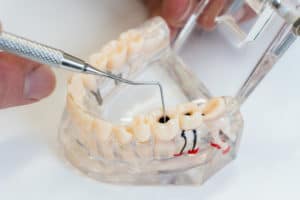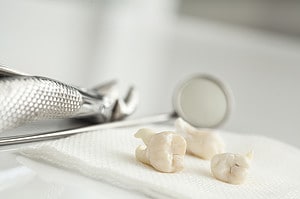Wisdom teeth removal typically takes 45 minutes to an hour, depending on the complexity of the extraction and the need for surgical intervention. The duration of the procedure may vary based on factors such as the tooth’s position and the type of anesthesia used.
Simple extractions of fully erupted teeth differ from surgical extractions needed for impacted or oddly angled teeth. Proper pre-op preparation and post-op care are vital for successful recovery. Understanding these aspects can help you navigate the wisdom teeth removal process effectively.
How Long Does Wisdom Teeth Removal Take to Complete?
Wisdom teeth removal typically takes 45 minutes to 1 hour. Simple extractions (1 tooth) might be quicker and take 20-30 minutes. Complex procedures or IV sedation can extend the time in the dentist’s office and take up to 90 minutes.
Factors Affecting Procedure Duration
Factors that may impact the duration of wisdom teeth removal include the complexity of the tooth’s position and the patient’s overall oral health. A surgical extraction, performed by a dental professional such as an oral surgeon, is often necessary for impacted teeth or when the tooth is not easily accessible.
The procedure duration can vary depending on the difficulty of the extraction, with some cases taking as little as 20 minutes while others may require over an hour.
Recovery time following a dental surgical procedure is crucial, and patients should diligently follow post-operative care instructions to avoid complications. In some instances, general anesthesia may be required, affecting the recovery process and increasing the overall procedure time.
Patients with good oral health and uncomplicated extractions typically experience shorter recovery times compared to those with underlying dental issues or complex surgical needs. Understanding these factors can help patients prepare for their wisdom teeth removal and anticipate the duration of the procedure.
Anaesthesia and Sedation Options
The selection of appropriate anesthesia and sedation options is crucial in ensuring a comfortable and safe experience during wisdom teeth removal surgery. Before the procedure, the oral surgeon or dentist will discuss the options based on the complexity of the extraction and the patient’s anxiety levels.
Local anaesthesia may be adequate for less complicated cases. This type of anesthesia numbs the specific area where the wisdom tooth will be removed, keeping the patient awake during the procedure.
On the other hand, for more complex extractions or for patients with high anxiety levels, general anesthesia or sedation may be recommended. General anesthesia involves putting the patient to sleep, while sedation helps the patient relax and may induce partial memory loss of the procedure.
Ultimately, the choice of anesthesia or sedation depends on the patient’s needs and the dentist or surgeon’s recommendation. To ensure a smooth and pain-free wisdom teeth removal procedure, it is essential to trust the healthcare provider’s expertise in selecting the most suitable option.
Simple Vs. Surgical Extraction
When deciding between simple and surgical extraction for wisdom teeth removal, the complexity of the procedure and the specific condition of the impacted teeth play a significant role in determining the most appropriate approach.
Simple extractions are typically performed on wisdom teeth that have fully erupted through the gum and are similar to regular tooth extractions. These extractions are done under local anesthesia, and the tooth is removed using dental tools.
On the other hand, surgical extractions are more complex and are necessary for impacted wisdom teeth that haven’t fully erupted or are growing at odd angles. In surgical extraction, the dentist may need to make an incision into the gum and may even need to break the tooth into pieces for easier removal. Depending on the case, this type of extraction may be done under local anesthesia with sedation or general anesthesia.
It’s crucial to follow post-operative care instructions diligently to prevent complications at the extraction site, such as infection or excessive bleeding.
Pre-op Preparation Steps
Proper preoperative preparation is essential for a successful wisdom teeth removal procedure. Patients scheduled for wisdom teeth removal surgery should follow specific preparation instructions provided by their healthcare provider.
These instructions typically include guidelines on fasting before the procedure to prevent risks associated with anesthesia, such as aspiration. Patients may also be advised to arrange for a responsible adult to drive them home after the surgery, as they may still be under the effects of anesthesia.
The preparation process often involves discussing any medications the patient is currently taking with the oral surgeon to ensure a smooth surgery and recovery. Patients should also be informed about the estimated time the surgery will take, which can vary depending on the complexity of the extraction.
Understanding the risks involved in the procedure and following preoperative instructions diligently can contribute to a more comfortable recovery process for patients post-surgery.
Intraoperative Process Overview
Preoperative discussions on medication usage and estimated surgery duration pave the way for a smooth transition into the intraoperative process overview of wisdom teeth removal.
During the tooth extraction, the dentist or oral surgeon will ensure the patient’s comfort by administering local anesthesia to numb the area and potentially provide sedation to alleviate any anxiety.
Wisdom teeth are often impacted, meaning they are trapped in the gums or jawbone. If left untreated, this can lead to tooth pain, swelling, and even infection. The extraction process involves carefully removing the tooth, sometimes requiring minor incisions in the gums to access the impacted tooth.
The duration of the procedure can vary depending on the complexity of the case, but a straightforward extraction generally takes about 45 minutes to an hour.
Once the tooth is successfully removed, the focus shifts to ensuring proper gum healing to minimise post-operative complications.
Post-op Recovery Timeline
Following wisdom teeth removal, patients can expect to undergo a structured postoperative recovery timeline to ensure optimal healing and minimise complications.
In the first days after the procedure, some discomfort, pain, swelling, and minor bleeding are common. To facilitate healing, it is crucial to follow the post-op recovery timeline your oral surgeon provides. Typically, patients are advised to eat only soft foods for the first few days to avoid putting pressure on the surgical site.
Follow specific instructions, such as avoiding straws, gently rinsing the mouth with salt water, and taking prescribed medications as directed. As the days progress, the discomfort should gradually decrease, and healing should begin. Swelling will also subside over time.
Remember to attend all follow-up appointments to ensure proper monitoring of your recovery progress and to address any concerns promptly. Adhering to the post-op recovery timeline and guidelines can promote a smooth and successful healing process.
Follow-up Care and Recommendations
After completing the initial postoperative recovery period, it is important for patients to adhere to follow-up care and recommendations to monitor healing progress and address any potential issues effectively.
Following wisdom teeth removal, patients should closely follow the post-operative instructions provided by their dental team. This includes proper pain management techniques, such as taking prescribed medications as directed and applying ice packs to reduce swelling.
Monitoring for signs of infection and practising good oral hygiene are crucial for infection prevention. Eating restrictions, such as sticking to soft foods and avoiding hard, crunchy, or spicy foods, aid in the healing process.
Attending any scheduled follow-up appointments is essential to assessing recovery time, ensuring proper healing, and promptly addressing any concerns. Patients should also communicate any persistent pain, excessive bleeding, or other symptoms to their dental team promptly. Understanding and addressing risk factors, such as smoking or certain medical conditions, can also contribute to a smoother recovery process.
Final Thoughts on Wisdom Tooth Extraction Time
A wisdom tooth extraction is a surgical procedure to remove the last molars that grow in behind the other teeth in late teens or early twenties. Your dentist might recommend an oral surgeon to remove your wisdom teeth in an outpatient procedure with a quick recovery.
Wisdom tooth removal is a fairly efficient procedure, however, the number of teeth, the complexity of your procedure, and the presence of tooth decay will all determine how long it takes. In some cases, wisdom teeth removal may be necessary to address tooth decay or prevent future complications.
As you prepare for your wisdom teeth removal, remember that it’s a procedure led by skilled professionals. Just as a conductor guides an orchestra, rely on the expertise of your dentists at Aspendale Gardens Dental Care in Aspendale Gardens, VIC. Embrace this oral journey with confidence and know that you are in good hands with the team at Aspendale Gardens Dental Care.











